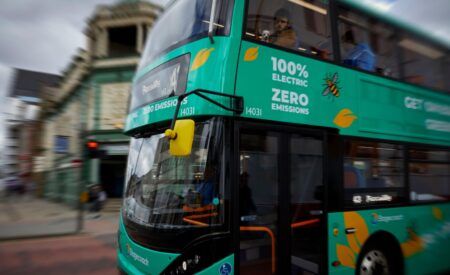New York City’s Metropolitan Transportation Authority (MTA) is seeking federal aid as on the other side of the Atlantic, Transport for London (TfL) is also predicting it may need some assistance from the government to cope with the impact of COVID-19.
A significant drop in passenger numbers across the various modes of travel that both the Metropolitan Transportation Authority (MTA) and TfL provide since the outbreak of the pandemic has put a severe strain on their respective finances.
Seeing a 60% drop in subway use, 49% on buses, 90% on the Metro-North and 67% on the Lon Island Rail Road, MTA chairman and CEO Patrick J. Foye has sent a letter to the New York Congressional Delegation urgently requesting more than $4 billion in federal aid.
 He said, “The stark reality is that as more people stay home following the advice of medical experts, the MTA is now facing financial calamity.
He said, “The stark reality is that as more people stay home following the advice of medical experts, the MTA is now facing financial calamity.
“MTA revenue has plummeted as we provide these essential services. We project the full impact will be over $4 billion by the end of 2020 – even without accounting for the expected collapse of the more than $6 billion in state and local taxes dedicated to the MTA.”
TfL’s financial health was already pressured due to an ‘underlying softness’ in demand and passenger revenue, largely caused by economic uncertainty, had been experienced since October 2019 with both Tube and bus revenues down 2% over the period. Last month’s stormy weather made the situation worse but the continuing spread and impact of the virus has led to a further drop in passenger numbers of 19% and 10% respectively.
So far, nine tube stations have closed but a total of 40 could be shut, while bus services are also to be reduced as London’s transport authority seeks to play its part in combatting the pandemic.
TfL’s financial policies require it to keep a minimum cash balance of £1.2bn to provide liquidity to absorb sudden financial shocks. Above this, it aims to hold a further £600m for other strategic risks, for example sudden reductions in passenger numbers due to pandemic.

Chief finance officer, Simon Kilonback, said, “Our best forecast, based on government scenarios, is that the financial impact of the coronavirus could be up to £500m.
“We manage our finances prudently, and have reduced our deficit hugely in recent years. This means that we can manage the impacts on our passenger numbers and finances that are currently envisaged. But, given the nature of the situation, we will be looking to the Government to provide appropriate financial support.
“We continue to follow and communicate Public Health England advice, including that there is no specific risk on public transport. We’ve also stepped up our cleaning regime from the already very high standards to give our customers and staff further reassurance.”





